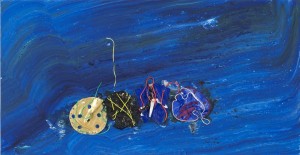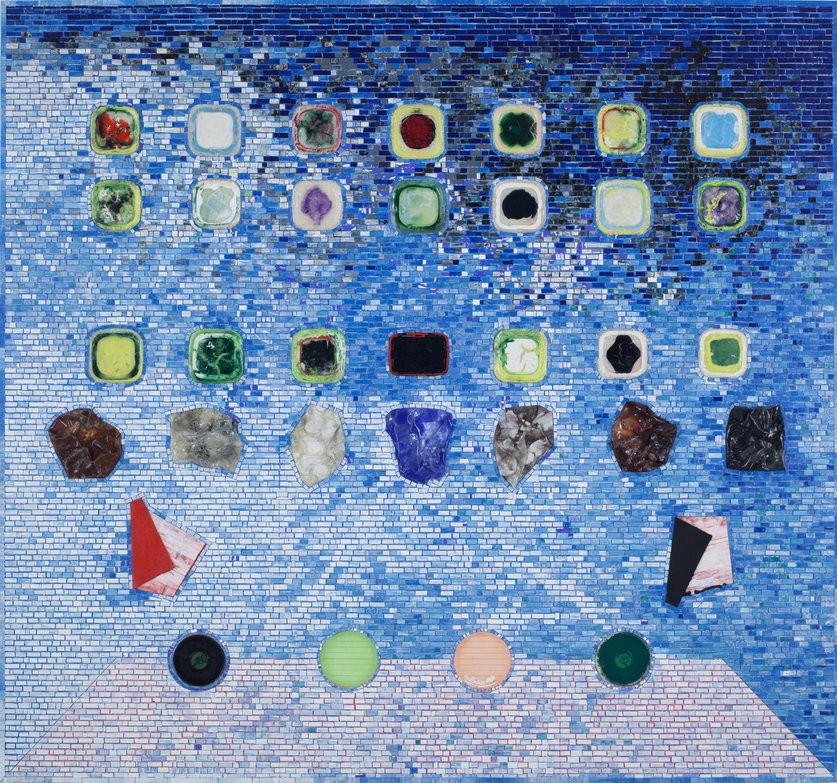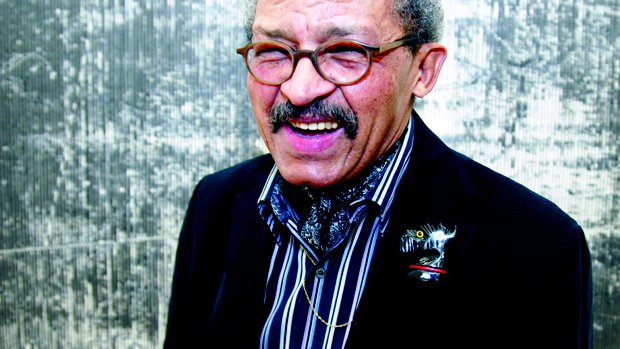
Jack Whitten, New Work
Zeno X Gallery, Antwerp Borgerhout
April 29 – June 13, 2015
Preview: April 26, 3-6 pm
Byzantine Quartet, 2013.
Interview with Whitten:
Though painter Jack Whitten dabbled in representation in the 1960s, abstraction has dominated his practice since then. His current show at New York’s Alexander Gray Associates (through Oct. 12) offers a suite of richly textured paintings that find the artist manipulating acrylic in surprising ways: Whitten doesn’t just pour or even rake, he also molds pigment into small-scale sculptural objects that he tiles or drops onto his complex surfaces.
Whitten’s work often memorializes deceased friends and family members, or addresses social issues. The artist maintains that identity—Whitten, born in Bessemer, Ala., is black—is present in the work despite its non-objective nature.
The artist talked with A.i.A. by phone recently about abstraction’s capacity to hold meaning and the role of African-American artists today.
 Transmission, 2013.
Transmission, 2013.
Jessica Dawson
You’ve got a painting in this show calledSandbox: For The Children Of Sandy Hook Elementary School[2013]. It has a sweet, candy-store palette, and the acrylic molds embedded in its surface have a confectionary quality. Without reading the title, one wouldn’t know its inspiration. How do you see abstraction conveying meaning?
Jack Whitten
I maintain that abstraction is a symbol. It’s very much like holding a camera. I can direct it toward any symbol that I choose. As a painter, I have to locate that symbol in the paint, as opposed to giving an illustrated narrative. The narrative content and the figure are still in there-they’re built into the paint.
 Nine cd’s for the firespitter, 2013.
Nine cd’s for the firespitter, 2013.
Dawson
I recently spoke with the painter Kerry James Marshall, who believes that black artists should assert the black figure in their work because of their history of exclusion. What do you think?
Whitten
I go along with that—up to a certain point. I agreed with him 100 percent in regard to work from the 1960s. But I do believe we’ve gone beyond that now. I sincerely believe that in the black community of artists, especially those of us dealing with abstraction, art has to go beyond the general notions of race, gender, nationalism. Things have evolved to the degree where there is a possibility of a new sensibility out there. We’re into a global aesthetic here and anyone that doesn’t see that has a real old-fashioned way of thinking.
 Selfportrait, 2014.
Selfportrait, 2014.
Dawson
But this country has still has racial issues.
Whitten
We know that. But we also know that those of us who build something that lies beyond the notion of race have to take advantage of possibilities. We have to grab the opportunity when we have it.
I met Jacob Lawrence. He did narrative work. Romare Bearden. Norman Lewis. All of those artists taught me that a lot of ground has been covered, and you do not have to limit your degree of expressive freedom. Black artists before me laid a pretty good foundation that allows me to do what I do today. My ass is not floating out there alone.
 Apps for Obama, 2011.
Apps for Obama, 2011.
Dawson
So you’ve got a utopian vision of abstraction?
Whitten
I see art as the only hope we have left. I don’t see it in religion or politics. If we as artists can’t take advantage of it, who can?
(interview Jessica Dawson, Art in America, October 2013.
 Portrait, 2012.
Portrait, 2012.
Courtesy: Zeno X Gallery. The works in this post are not (all) in the exhibition. They want to give an impression of the work of Whitten.
